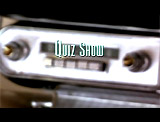
|
Quiz Show (1994)
In director Robert Redford's engrossing morality play
about the fixed quiz show scandals of the late 1950's - involving
two "Twenty One" NBC TV quiz show contestants in a program
sponsored by Geritol: a WASP patrician cheater and a Queens-living
Jew:
- the opening pre-credits sequence - set in a Chrysler
showroom where cigar-chomping, recent Harvard Law School graduate
Richard 'Dick' Goodwin (Rob Morrow) was being tempted to buy a
luxury Chrysler 300D convertible with an interior of "pigskin
and calfskin - hand-rubbed"; a broadcast on the car's radio
announced the US' losing space race with Russia ("The Russians
have beaten us into outer space. You are listening to the sound
of Sputnik, a satellite launched this morning via rocket, in orbit,
right now, directly over our heads. A sound that says all is not
well with America"); a sense of luring danger was re-emphasized
with Bobby Darin's snappy, upbeat "Mack the Knife" (bookended
at the end of the film) about sharks with "pearly white" teeth
- the cross-cutting montage sequence of the "Twenty-One"
show's 'secret' answers transported from a secured bank vault in an
armored truck through the streets of NYC with a police motorcycle
escort, with images of sheep-like workers urgently rushing home
or to TV sets in the evening to watch the show, and ending with
the low-angle, towering view of 30 Rockefeller Center
- the broadcast of the late 1950s NBC-TV game show "Twenty-One"
with authentic period design of the studio, and the prominent product
placement of sponsor Geritol ("America's #1 tonic. Geritol,
the fast-acting, high-potency tonic, that helps you feel... stronger...
fast... "), as the announcer stated: "Brought to you
by NBC, the National Broadcasting Company, broadcasting nationally
coast to coast, from New York to Los Angeles, from Seattle to St.
Petersburg via a vast network of affiliates crisscrossing the country...Two
players racing to score 21 points, each in a soundproof television
studio, not knowing the other one's score, with $500 riding on
each point...as they both play 21"

|

|
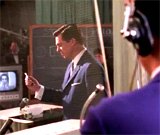
|
Twenty-One Host Jack Barry
(Christopher McDonald)
|
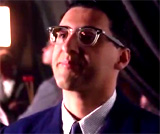
|
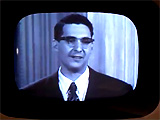
|
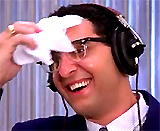
|
|
Herb Stempel (John Turturro)
|
- the preening host Jack Barry (Christopher McDonald),
placed between the two isolation booths, announced:
"Remember, the questions on 'Twenty-One' are secured each week
in a Manhattan bank vault 'til just before show time. So right now,
let's meet Herbert Stempel and his challenger, as Geritol, America's
#1 tonic, presents 'Twenty-One'"
- the character of Jewish working class, Queens-living,
geeky 29-year-old ex-G.I. college student, trivia expert and show
contestant Herb Stempel (John Turturro), who was overly-talkative
and kept interrupting the host; a blonde watching the show with Geritol
CEO Martin Rittenhome (Martin Scorsese) commented on Stempel's unappealing
appearance: "Now, there's a face for radio" - there were
efforts already underway to unseat Stempel, who remained "unstumpable" genius
during numerous stand-offs against opponents - appearing desperate,
nervous and uneasy (non-telegenic qualities) with a darkened tooth
in the sound-proof booth (later, he boasted to his wife Toby (Johann
Carlo):
"I'm the guy who knows everything")
- the behind-the scenes maneuverings of NBC Chief Robert
Kintner (Allan Rich) and Geritol's CEO to remove Stempel from his
top spot because ratings had leveled; there were pressures on NBC
executives: slimeball producer Dan Enright (David Paymer) and his
assistant Albert Freedman (Hank Azaria), to boost ratings by finding
an individual to defeat and replace the All-American underdog Herb;
(one of the TV show's viewers was Charles Van Doren (Ralph Fiennes))
- who was introduced astutely answering some of the questions during
the show (before Herb did) by himself in a bar
|
Behind-the-Scenes Efforts to Remove Herb
|
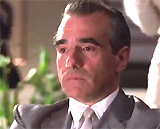
|

|
Geritol CEO Martin Rittenhome
(Martin Scorsese)
|
NBC Chief Robert Kintner (Allan Rich)
|
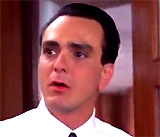
|

|
|
NBC producer Albert Freedman (Hank Azaria)
|
NBC producer Dan Enright (David Paymer)
|
- the coincidental auditioning of popular, clean-cut,
handsome, distinguished and intelligent, WASP-ish bachelor Charles
Van Doren (Ralph Fiennes) to be a contestant for one of the Barry/Enright
Production quiz shows (Tic Tac Dough) - he was suggested instead
for 'Twenty-One'; his credentials were impeccable: an English instructor
at Columbia University (for $86 dollars a week) - the son of the
famed, ethical Pulitzer Prize-winning poet, Professor Mark Van
Doren (Paul Scofield) also at Columbia; he was thought to be a
perfect replacement for Herb, who was regarded by Freedman as:
"an annoying Jewish guy with a sidewall haircut"
- the first suggestion that the show was rigged came
when both Freedman and Enright asked Van Doren if he would appear
on the show and answer questions (from his audition) that he had
already gotten right; Van Doren wondered: "l thought the questions
were in a bank vault....l think l'd really rather try to beat him
honestly"; Freedman replied: "lt's not like we'd be giving
you the answers. Just 'cause we know you know, you still know";
Van Doren was being lured into appearing on the show to answer questions
he already knew, but then mused to Freedman and Enright: ("I'm
just trying to imagine what Kant would make of this"); Freedman
responded: "I don't think he'd have a problem with it";
Enright added: "Think about what this could mean for the cause
of education"; when Van Doren decided against appearing ("lt
just doesn't seem right. l-l'd have to say no"), he changed
his mind when the two producers promised it would be on the up-and-up
(Enright: "So pure, it floats")
- the implications made to Herb at a restaurant during
dinner with Enright that the show's ratings had plateaued: ("They've
already seen you win, and they want something new"), while Herb
reacted:
"You think they want me to lose?...Joe Louis was the champ for
12 years. Nobody ever wanted Joe Louis to lose"; Enright was very
direct:
"Look, you lose when l tell you to lose...lt's an arrangement.
lt's always been an arrangement"; during the scene, Herb expressed
victimized anguish at being instructed to miss an easy question (about
the Best Picture winner of 1955 - regarding the well-known film Marty
(1955)) to hand a victory (in exchange for $70 grand) to his
next opponent; Stempel felt humiliated: ("l saw Marty three
times. The Best Picture from two years ago - and I don't know?");
Enright emphasized the drama of Stempel's loss ("Someone of your
intellect, and it's such a simple question - don't you see the drama
of that?...For 70 grand, Herb, you can afford to be humiliated");
later, he confided in his wife: "They want me to take a dive...They
have to utz me with a question any child knows.....They just put me
in an isolation booth and pump cyanide into it"

|
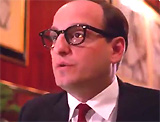
|

|
|
Herb Encouraged to Lose by Enright
|
- the tense sequence of Herb's appearance on the show
competing for the first time against Van Doren, when he was asked
the 'dive' question ("Which motion picture won the Academy
Award for 1955?") to which he deliberately answered wrongly
with "On the Waterfront"; in the round, Van Doren then
bid 11 points to win 21 with a question he had already answered
during his audition:
"Who was the commanding general of the Union army at that time
(when Ulysses S. Grant was briefly placed on arrest in 1862)?" -
he correctly answered 'General H.W. Halleck', and became the new
champion; his disorientation and conflicted feelings about winning
were reflected by his circular, dizzying descent down the stairs;
however, he began regular coaching of questions and answers by Freedman
- subsequently, Herb attacked the show and testified
to the New York D.A. Frank Hogan (who then convened a sealed grand
jury) on the "fixed" game show and how he was coached and
paid to lose ("take a dive"); now an outsider without popularity
or acclaim, Herb blamed anti-Semitic bias and maneuvering on the
part of the show; in his NBC office, Enright urged Herb to sign a
statement ("lt clears me and the show of any wrongdoing");
Herb refused and became incensed, after losing his prize money to
an unscrupulous bookie - angry that Van Doren was now popular, and
that he was completely forgotten and broke without any future in
television on an NBC panel show: ("That big uncircumcised putz
is on the cover of Time Magazine, and l can't even make the
top 42 for a panel show...That should be me on the cover of Time")
- the efforts of dogged federal investigator Dick Goodwin
to unseal the grand jury's records and findings, uncover information,
and eventually lead a Congressional legislative oversight sub-committee
into the TV quiz show scandal: "We're gonna put television on
trial. Television. Everybody in the country'll know about it...Sir,
l smell somethin'. At least give me a chance to see what l can dig
up"
- the mesmerizing 'Name That Shakespeare" game
played by Charles against his father Mark, at his father's birthday
party outdoor gathering in Cornwall, Connecticut, where he received
a console TV as a gift from Charles
- the startling implication and confession by Herb to
Goodwin that he assumed Van Doren was receiving the answers ahead
of time because he also was dishonestly given the answers: "l
know he got the answers.... Because l got the answers"
- during a high-stakes poker game that included Van
Doren and Goodwin, Van Doren bet $50 on his hand and Goodwin tellingly
accused him of lying during the game ("I know you're lying")
- Van Doren retorted: "Bluffing. The word is bluffing"
- the late night-time scene of a strained-looking Charles
with his father Mark alone at the dinner table in the family home
while eating chocolate cake with a cold bottle of milk; the disbelieving
Mark wondered how his son made answering trivia questions look so
easy: "Good God, the pressure! All those lights, the money,
those strange little booths, that man talking so fast, like being
in a bull ring. l don't think l could remember my name.... lt's just
amazing that you could make it look so easy"
- the smash-zoom (Vertigo-like)
camera angle of Van Doren from behind in the booth - who ended his
reign as champion on a question about the King of Belgium; he answered
Leopold (the correct answer was King Baudouin); he deliberately unseated
himself due to the pressure and his own conscience, and then was
offered, on the spot, a lucrative regular spot as a special cultural
correspondent on the NBC Today Show (with Dave Garroway) -
[Note: Shortly later, Van Doren admitted to Goodwin that he knew
the answer, but after 14 weeks "wanted to get off the show"]

|
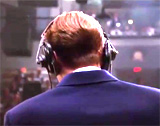
|
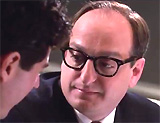
|
|
Father-Son Conversation Over Milk and Cake
|
Smash-Zoom
|
Goodwin's Presentation of Concrete Evidence Against
Enright and the Show
|
- the sequence of Goodwin presenting concrete evidence
of the show's corruption to Enright that a previous contestant,
James Snodgrass, had been given answers previous to his appearance
on the show: "ln this envelope are all the questions that
James Snodgrass was asked on Twenty-One, okay? The odd thing about
this envelope is he appeared on the show on January 13, yet somehow
he mailed this to himself January 11, registered mail. l'd say
that's pretty god-damn concrete, wouldn't you?"; Enright responded: "You
want me to implicate the network?...lf l even hinted that the network
knew, and they didn't know, they'd never let me through the door
again"
- the scene of Goodwin confronting Van Doren with the
insightful and persistent question: "Are you telling me everybody
got the answers but you?"
- during the 1959 House sub-committee testimony, Herb
testified: "l was given the questions and answers in advance" and
that he had been rehearsed; he also implicated Van Doren without
proof, reducing his credibility: ("Why would they give me the
answers and not give him the answers?...You don't fix one guy without
fixing the other guy")
- in a private meeting with Goodwin, the show's sponsor,
smug (Pharmaceuticals Inc.) Geritol president Martin Rittenhome claimed
no responsibility for the day-to-day operations of the network; Rittenhome
delivered a powerful line to Goodwin about the continuing popularity
of quiz shows: "NBC is gonna go on. Geritol's gonna go on. Makes
me wonder what you hope to accomplish with all this....Even the quiz
shows'll be back. Why fix them? Think about it. You could do exactly
the same thing by just making the questions easier. See, the audience
didn't tune in to watch some amazing display of intellectual ability.
They just wanted to watch the money"; also before the sub-committee,
NBC top executive Robert Kintner flatly stated: ("l relied on
the excellent reputation of Dan Enright....I never, never imagined
they could perpetrate this fraud on the American public")
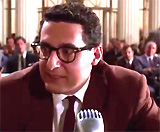
|
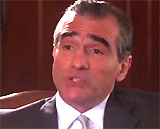
|

|
|
Herb Stempel
|
Martin Rittenhome
|
Robert Kintner
|
- the news relayed to federal investigator Goodwin
that Van Doren had made an official public statement that "at
no time was he supplied with any questions, answers -- " -
Goodwin knew this was an outright lie; with Van Doren in private,
Goodwin recalled a family story about his uncle who strangely confessed
to an affair eight years later - mainly because: "It was 'the
getting away with it' part he couldn't live with"
- the scene of Charles' discussion with his father about
the ongoing investigation, who then quipped: "Cheating on a
quiz show. That's like plagiarizing a comic strip"; he confessed
to his stunned father that he had cheated - his father responded: "They
gave you the answers?"; Charles explained his guilt away:
("At first, they just asked me questions they already knew l
knew the answers to. We ran through those, and l still didn't want
them to actually give me the answers, so l had them give me the questions
and l'd go look up the answers on my own, as if that were any different.
Well, we ran through those in a couple of weeks, and then l just
didn't have the time. And finally, it just seemed silly"); his
father asked: "They gave you all that money to answer questions
they knew you knew!?"; Charles answered: "lt's television,
Dad! Look, it's, it's just television", and provided a Shakespearean
quote about the rigged quiz show: "An ill-favored thing, sir....But
mine own. It was mine"; after his father objected to a continuation
of their game ("This is not the time to play games"), he
also struck back with a pained response:
"Your name is mine!"
- the climactic scene of Van Doren testifying before
a House sub-committee with a prepared statement, and finally, in
a "soul-searching" confession, he told the truth about
his role in the conspiracy:
"I would give almost anything I have to reverse the course of
my life in the last year. The past doesn't change for anyone. But at
least I can learn from the past. I've learned a lot about life. I've
learned a lot about myself and about the responsibilities any man has
to his fellow man. I've learned a lot about good and evil - they're
not always what they appear to be. I was involved, deeply involved,
in a deception. I have deceived my friends, and I have millions of
them. I lied to the American people. I lied about what I knew and then
I lied about what I did not know. In a sense, I was like a child who
refuses to admit a fact in the hope that it will go away. Of course,
it did not go away. I was scared, scared to death. I had no solid position,
no basis to stand on for my self. There was one way out and that was
simply to tell the truth. It may sound trite to you, but I've found
myself again after a number of years. I've been acting a role, maybe
all my life, of thinking that I've done more, accomplished more, produced
more than I have. I have had all the breaks. I have stood on the shoulders
of life, and I've never gotten down into the dirt to build, to erect
a foundation of my own. I have flown too high on borrowed wings. Everything
came too easy. That is why I am here today"; after his appearance
before the committee, Van Doren was fired from Today and Columbia's
Board of Trustees was planning to ask for his resignation
- Herb's words to a reporter outside the sub-committee
hearing after Van Doren's testimony: "You know what the problem
with you bums is? You can never leave a guy alone, unless you're
leavin' him alone"; Goodwin worried about the effects of Van
Doren's testimony: "l thought we were gonna get television.
The truth is, television is gonna get us"
- Enright and Freedman took the fall; Enright admitted
under oath to the sub-committee that he had helped rig the shows
via media manipulation for entertainment's sake: "Yes, we did
one thing wrong. We were too successful...The sponsor makes out,
the network makes out, the contestants see money they probably would
never see in a lifetime and the public is entertained. So who gets
hurt?"; Freedman also confessed to being guilty and added: "Give
the public what they want...lt's entertainment. We're not exactly
hardened criminals here. We're, we're in show business"
- the film's ending - capped by subtle, accusatory,
slow-motion end credits showing a late 50s television audience mindlessly
laughing and applauding ('watching the money' so to speak) as Lyle
Lovett's somber "Moritat (Mack the Knife)" played
|

Car Radio Broadcast About Sputnik
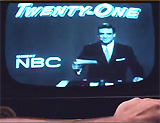

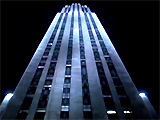
Nightly TV Broadcast From Rockefeller Center

Geritol Commercial
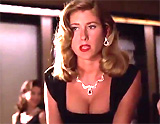
Regarding Herb: "Now there's a face for radio"
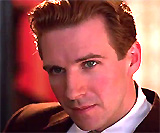
Charles Van Doren
(Ralph Fiennes)

Lured onto the Show: "I'm just trying to imagine what
Kant would make of this"
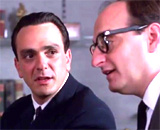
Freedman: "I don't think he'd have a problem
with it"

Van Doren Convinced to Be an Honest Contestant (Enright: "So
pure, it floats")
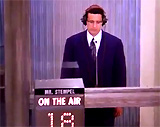
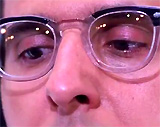
Herb's 'Dive' Question: "Which motion picture
won the Academy Award for 1955?"
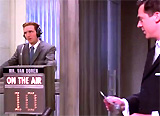
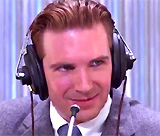
Van Doren's Winning Answer: "General Halleck"

Van Doren's Dizzying Reaction

"An egghead turned national hero"
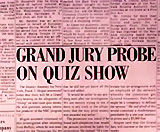
Grand Jury Probe
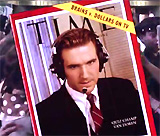
Acclaim and Fame for Van Doren

Herb - Spiteful and Angry ("That should be
me on the cover of Time")
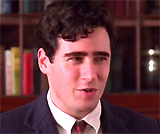
Goodwin ("We're gonna put television on trial")
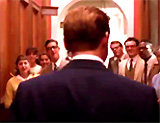
Student Adulation for Van Doren at Columbia
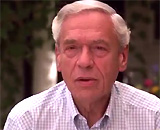
Charles' Father: Shakespearean Quotes Quiz Game
Against Son
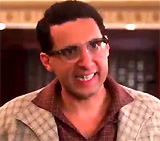
Herb: "I know he got the answers...because
I got the answers"

Van Doren: "The word is 'bluffing'"
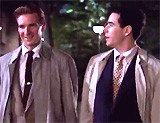
Goodwin's Tale to Charles: "It was 'the getting
away with it' part he couldn't live with"
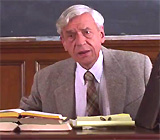
Charles' Father Incredulous Reaction: "They
gave you the answers!"
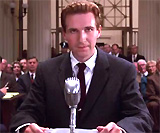

Van Doren's Climactic House Sub-Committee Testimony
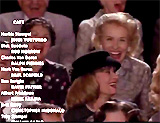
End Credits
|






























